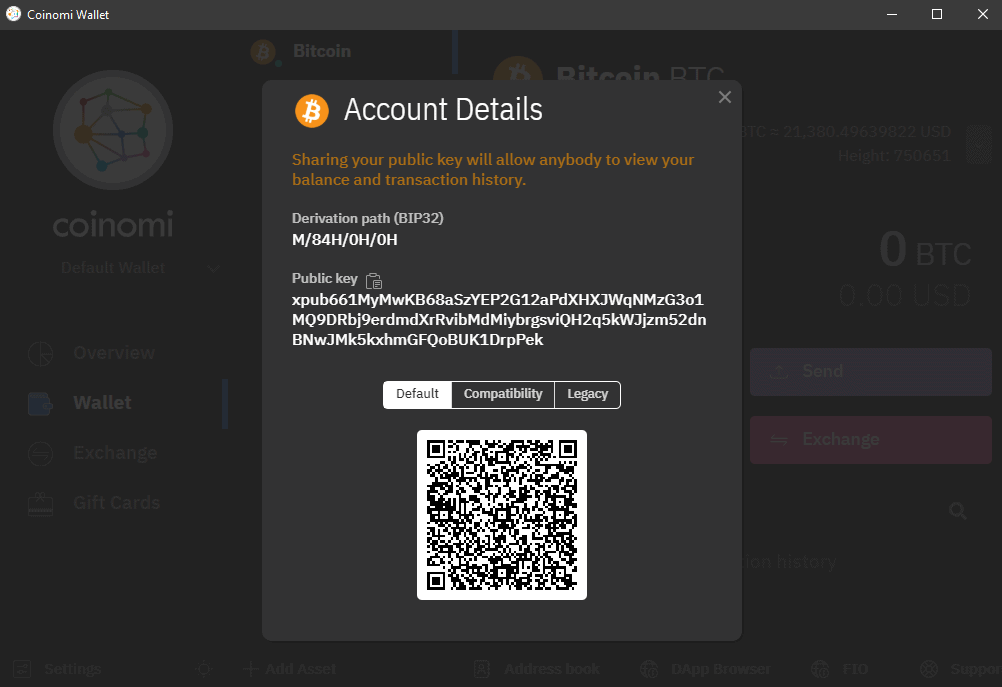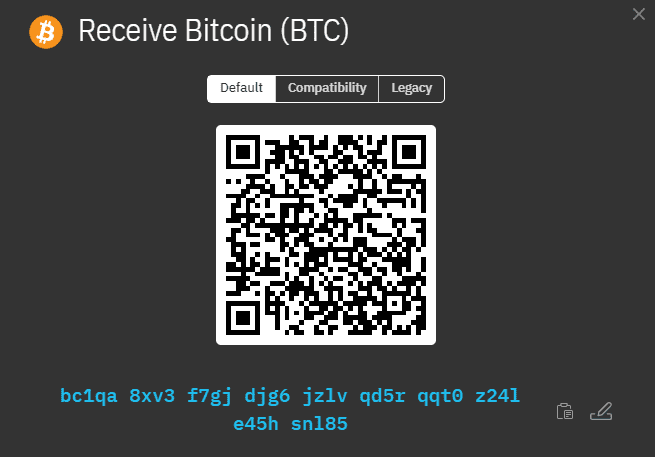What is a Bitcoin Wallet?
What is a Bitcoin Wallet?
Have you ever wondered what is a Bitcoin wallet? Put simply, a Bitcoin wallet is the tool that enables a user to send, receive, and store Bitcoin. At it’s core, a wallet is a mechanism for storing a public and private key for the Bitcoin network. There are a three major categories that can be used to describe Bitcoin wallets. Private Key Custody, Networking capabilities, and wallet interface.
Is the wallet capable of interacting with the internet? Where does your private key physically exist? Who has access to your private key? Who is responsible for signing transactions submitted to the blockchain? If you are considering a foray into Bitcoin, these are all important questions to ask yourself before opening a wallet.

Private Key Custody
Custodial Wallet
Noncustodial Wallet
Networking Capabilities
Hot Wallet
Cold Storage Wallet
Wallet Interface
Hardware Wallet
Software Wallet
Paper Wallet
Consider a Bitcoin Wallet vs a Venmo Account
If you are still scratching your head after the previous section, take a deep breath, and simply imagine the popular payment app Venmo. Think of a Bitcoin wallet as a more complicated version of your Venmo account. Your Venmo username is the wallet address. You share your Venmo username with other Venmo users so they can send you money. Your Venmo password is your private key. You need it to sign in to Venmo if you want to transfer money to someone else, but you would never share your private key, or anyone could transfer money from your account.
In many scenarios, wallets, exchanges, and applications handle the complexities of this step behind the scenes, but that is not always the case. Every time Bitcoin is transferred, a transaction is created that contains 4 elements: The recipient wallet address, the sender wallet address, the sender private key, and the amount that will be sent. The sender’s private key is used to sign the transaction, indicating the individual submitting the transaction has permission to be transferring Bitcoin between the two wallets. Protecting your private key is essential. A good general-rule-of-thumb is to never share your private key with someone you met on the internet.
Public Key
The public key associated with a Bitcoin wallet is the alphanumeric string used to identify that wallet to other Bitcoin users. The following screenshots show the user interface for the Coinomi Bitcoin wallet. These screenshots should also help emphasize the difference between a public key and a wallet address.
The testing account has the following public key:
xpub661MyMwKB68aSzYEP2G12aPdXHXJWqNMzG3o1MQ9DRbj9erdmdXrRvibMdMiybrgsviQH2q5kWJjzm52dnBNwJMk5kxhmGFQoBUK1DrpPek
The testing account has the following wallet address:
bc1qa 8xv3 f7gj djg6 jzlv qd5r qqt0 z24l e45h snl85
Public Key vs Wallet Address – What is a Bitcoin Wallet?


Both screenshots feature the Coinomi desktop wallet, a popular storage solution that supports a myriad of digital assets. If you refer to the screenshot on the left, you will see the public key for our test wallet. The screenshot on the right displays the wallet address. Both images feature QR codes to more easily facilitate mobile transactions. A wallet address is a hashed version of a Bitcoin user’s public key.
While software wallets are often perfectly suited for regular Bitcoin transactions, if you intend to make a significant investment into Bitcoin, you may want to consider purchasing a hardware wallet. The linked article provides a detailed overview of hardware wallets, followed by a wide array of commercially available units.
If you encounter a cryptocurrency data loss situation with a hardware or software wallet the cryptocurrency data recovery professionals at Gillware are your best chance at recovering your funds.
Private Key
The private key associated with a Bitcoin wallet is the 256-bit number used to sign transactions before they are submitted to the Bitcoin network. Maintaining proper private key security is essential if you are using a noncustodial wallet.
Ledger
The word ledger predates Bitcoin and the internet by several hundred years. A Ledger, or book of accounts, is an elementary accounting system that records credit and debit transactions for individuals or organizations.
Distributed Ledger
Bitcoin’s Distributed ledger is akin to a *really* big book of accounts that contains every Bitcoin transaction since the network first launched. Around the world, thousands of technically savvy individuals operate computers known as Bitcoin nodes that store the most recent distributed ledger for Bitcoin blockchain.
Understanding Blockchain Technology Requires Effort
While many individuals are capable of understanding the technical elements of blockchain technology, most are unwilling to put in the effort. Some will simply refrain from investing in cryptocurrency, which is a reasonable stance to take on the most volatile asset in the history of financial markets. There’s also a (far less reasonable) crowd that understands little of blockchain technology, yet that does not stop them from “investing” in various digital assets. The final section describes a hypothetical “Rufus” who belongs to the latter group, and shares a name with the author’s dog.
Don’t be Like Rufus
When you consider how much complexity lies at the core of peer to peer digital currency, it should hardly be surprising that Rufus doesn’t understand any of it. Rufus is a self-proclaimed crypto-expert and passionate NFT collector, but he couldn’t care less about the underlying components of blockchain technology. He may never need to know what a private key is used for, that said, investing in concepts you don’t understand is a recipe for failure.
Many inexperienced investors follow general market sentiment, make emotional trading decisions, and lose money. This phenomenon is especially common in the various cryptocurrency echo-chambers on a handful of social media platforms. Individuals who don’t understand what they are investing in are far more likely to make bad decisions. Rufus is one of these people.
Rufus considers unsubstantiated claims on Reddit to be credible information akin to a reliable news source. Despite the fact that Rufus’ Dogecoin “investment” is down 74% since he made the trade, he is content knowing that he’s still a billionaire.
Don’t be like Rufus. If you paid attention to the concepts outlined in this article, you are miles ahead of the millions of real-world Rufii who think the useless clone of Dogecoin they just found on YouTube is “going to the moon”.

Rufus certainly couldn’t provide a technical response to the question: “What is a Bitcoin Wallet?”, but he is still a very good boy.
